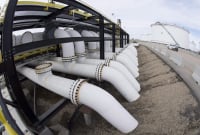Support strong Canadian climate journalism for 2025
Alberta Premier Rachel Notley has appointed three experts to work with the energy industry to find ways to close an oil price gap that she says is costing the Canadian economy $80 million a day.
Notley says Canada is losing out because oil from Alberta is selling about $45 a barrel less than West Texas Intermediate in the United States.
"We will lose that $80 million tomorrow and the day after and the day after, as long as this price differential remains in place," she said at the legislature on Monday.
"Make no mistake, this price gap is a real and present danger to the Canadian economy."
Notley said the differential is due to a lack of pipeline capacity to move a growing glut of Alberta oil to markets.
"We should be shipping our oil through pipelines to new markets around the world," she said.
"Owing to decades of failure by successive Canadian governments, Canada is holding its own economy hostage and ... holding Alberta's economy hostage."
No option is off the table
The premier is travelling to Ottawa and Toronto next week to make her case.
The experts are Robert Skinner of the University of Calgary's School of Public Policy, deputy energy minister Coleen Volk and Brian Topp, Notley's former chief of staff and a policy consultant. Notley is giving them two to four weeks to report back to her.
Last week, Cenovus Energy and Canadian Natural Resources called for government-imposed temporary cuts until the oil glut clears up, but Suncor Energy and Husky Energy have rejected the idea.
Notley said no option is off the table.
In Ottawa, Energy Minister Amarjeet Sohi indicated the federal government has no short-term solutions to offer and remains focussed on expanding the Trans Mountain pipeline from Alberta to the B.C. coast as the long-term answer.
He acknowledged the oil industry and workers are hurting but said the federal government has no authority over or responsibility for cutting oil production.
"This is something that the province and the industry are engaging (on) and I’m pretty sure they’ll be in a better position to give you the answer on potential options," he said.
"What we are focused on is making sure that we’re building the pipeline capacity that will provide a long-term solution to the discounted prices that Alberta’s oil sector is facing. This is a result of ...inaction from the previous government where they failed to build a single pipeline to non-US global market. We have only one customer, which is the United States," he said.
"They’re becoming our competitor and we need to make sure that we’re expanding our market to non-US markets. That’s why we’re focused on moving forward on the Trans Mountain Pipeline expansion in the right way, responding to the issues that the court has identified on the marine safety issues as well as meaningful consultation with Indigenous communities to bring that project back on track."
Cenovus said in a statement that it's encouraged by Notley's announcement, but time is of the essence.
"While more pipelines and rail capacity are the long-term solution, we continue to believe that the only effective way to address wide differentials in the short term is through temporary industry-wide production cuts, which can only be mandated by government," said the company.
Price differential is punishing, Notley says
Notley said the price differential is an even bigger issue than the oil price roller-coaster Alberta has been dealing with for decades.
"Price spikes and price dips are one thing and, quite frankly, Albertans are used to that. But this is different. In the face of this punishing differential brought about by too few pipelines, we must do what we can to close this differential as much as we can."
The premier emphasized, however, that short- and medium-term solutions are not the answer.
"Everything that we do short of building new pipelines and getting more value from our resources is not a long-term fix."
Alberta must upgrade and refine more of its energy products at home, Notley, said, so she has also established a team to look for ways to develop new oil and natural gas processing plants in Alberta.
"Alberta is being treated as a branch plant for the U.S. and it's got to stop," she said.





Comments
The solution, both long and short term, is to "upgrade and refine more of its energy products at home, Notley said," Upgrading and refining tarsands at "home" (both BC and Alberta) could build more refineries while exporting a higher quality more valuable product (not sticky dilbit crude) down existing pipelines. Build refineries not pipelines!
Re "Notley said the differential is due to a lack of pipeline capacity to move a growing glut of Alberta oil to markets" in this she just says what (almost) everybody is saying, including editorialists and pundits. Such a claim flies in the face of elementary economics: If you increase the supply, the price will go down, not up.
The oil industry's price problem is the result of a glut on the world market and the fact that heavy oil is pretty low down on the market preference order.